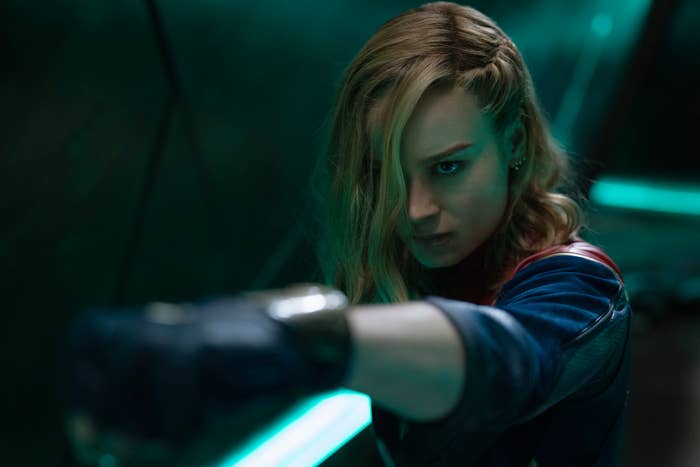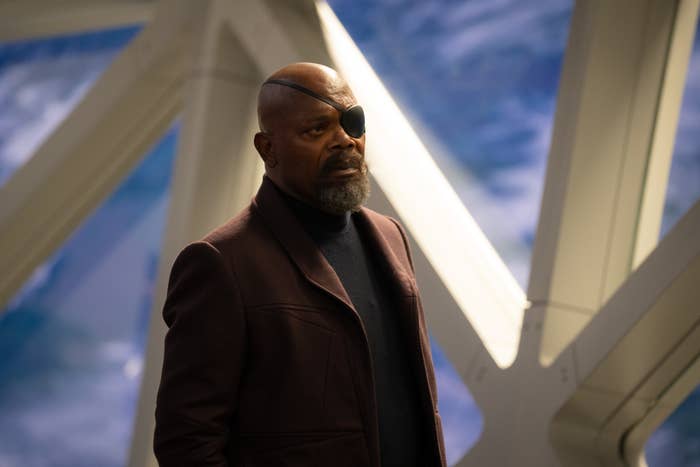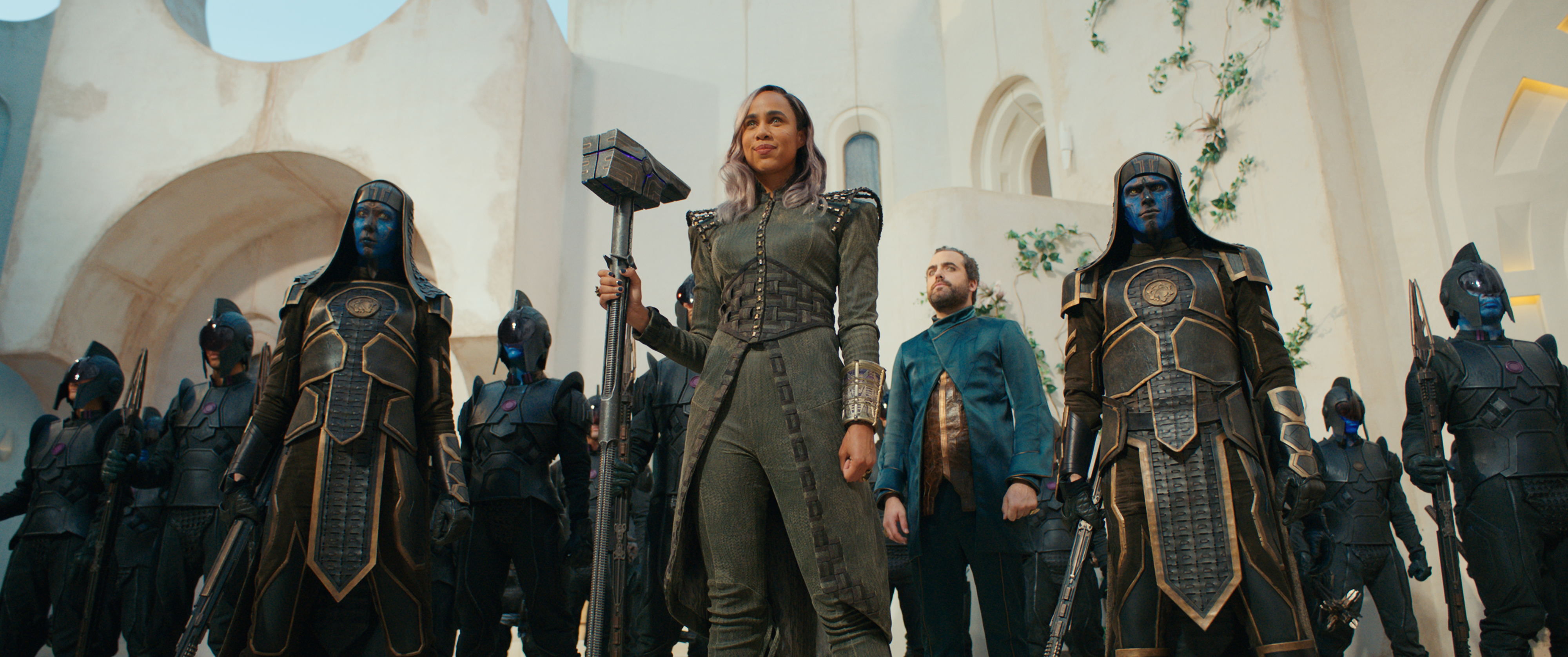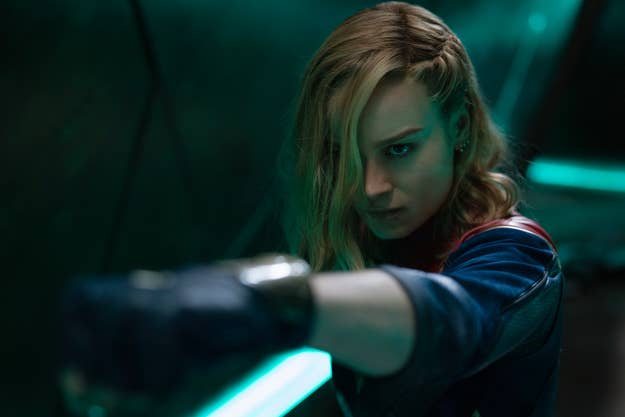
2023 is a year Marvel is probably keen to forget. After the near-disastrous theatrical release of Ant-Man and the Wasp: Quantumania, a subpar showing for the Secret Invasion Disney+ series, and plenty of outside noise about the future of the MCU, the once-titanic box office force is on the back foot as it closes out the year. And herein lies The Marvels. A follow up to the $1 billion hit Captain Marvel, the film arrives with a target on its back thanks to an overall decline in consistent quality and box office gains post-Endgame—however fair or unfair that feels. But, against all odds, The Marvels should help quiet the MCU's death rattle, at least temporarily.
Helmed by Nia DaCosta (2021’s Candyman), The Marvels is a throwback—a strange acknowledgment to make given that the MCU isn’t even 20 years old yet—to the early days of the grand Marvel experience. Despite a massive post-credits tag for the future of the Multiverse Saga, the film stays light on its feet for a breezy 105 minutes.

That expediency is noticeable right out of the gate. A pseudo-episodic vignette quickly reminds audiences of what’s happening with each of the titular Marvels: Carol (Brie Larson) is still trying to recover all of the memories that the warmongering alien race known as the Kree took from her during the events of Captain Marvel; Kamala Khan (Iman Vellani) is still discovering the scope of her powers in the wake of the events of Ms. Marvel; as is Monica Rambeau (Teyonah Parris), who got abilities of her own during WandaVision. After Kree extremist Dar-Benn (Zawe Ashton) finds one of the two ancient Quantum Bands—the other of which Kamala received from her grandmother—the three heroes find their powers suddenly intertwined with one another.
The entanglement leads the three to swap places whenever they use their abilities, building a compelling hook for the film's throughline leading into some genuinely inspired action sequences where the three switch places. An early standout bops and boops our characters around three locales: Kamala’s Jersey City home, an orbital drop pod with Nick Fury (Samuel L. Jackson) in tow, and a Kree warship in deep space. DaCosta manages to keep it flowing and legible, even as she adds other components into the mix—the best of which is the Khan family’s (in on her superheroic secret) subsequent reaction to abruptly having Kree warriors in the middle of their living room.

Adding too many components may work for a fight sequence, but it’s trickier when building a larger story. The Marvels has plenty of preamble as two streaming shows, WandaVision and Ms. Marvel, directly tie into the movie. The MCU’s biggest strength, once upon a time, is now viewed as its biggest weakness thanks to a corporate mandate for more streaming content. That glut makes the MCU feel more like homework than ever before. Fortunately, with Kamala as an audience surrogate, The Marvels features enough context clues for unaware audiences to get the gist of what’s happening if they managed to skip out on those Disney+ series.
The overarching pacing of the story is where The Marvels becomes too tangled and at odds with itself. Rescheduled four different times, with ample reshoots and a script credited to three writers (DaCosta, Megan McDonnell, and Elissa Karasik), the narrative of the film jumps from moment to moment with hardly a connective strand, particularly in its second and third acts. One scene meant to mark the start of the conclusion clearly feels like a late-game addition and arrives after the film introduces and dispenses with a whole location. Compounding these issues is that this entire stretch feels edited within an inch of its life. That’s to say nothing of Dar-Benn, which is yet another underbaked MCU villain role reminiscent of foes of phases past despite Ashton giving it her all.

Strong creative ideas help raise the film though. The aforementioned fights are among the best in the MCU, overflowing with a kineticism not felt since Shang-Chi. The Marvels has other flourishes, too, whether it’s Kamala’s comic-book-like internal monologue returning from Ms. Marvel to significant effect, a locale filled with people who talk exclusively through song with architecture that looks like it’s Star Wars by way of The Little Mermaid, or even a gutsily weird, creature-feature-filled third-act sequence soundtracked to a Broadway smash hit.
The character work of The Marvels’ three leads is its biggest strength, serving as a grounding force as the film barrels toward its conclusion. Larson, whose affable personality felt cast aside in Captain Marvel, lands a script better tailored to her talents. The MCU version of Carol is still powerful, grounded, and strong, but there’s a lightness to her that felt largely absent in the first installment. Parris is stuck with a lot of exposition (seemingly the price to pay since her character is the de facto scientist on the team) but delivers it with a knowing wink. Most importantly, she nails the emotional conflict between Monica and Carol with real gravitas. The MCU often undercuts these human beats with a poorly timed joke, but DaCosta allows Larson and Parris to sort through these without rushing to a gag—and the movie is stronger for it.

But the undeniable breakout will be Vellani, who remains the best-cast role in the MCU since Robert Downey Jr. As Kamala, her portrayal has such life to it that it transcends the screen. You become immediately fixed to her presence. DaCosta smartly positions Kamala as the emotional heartbeat of The Marvels, and the film is strong because of it. Fangirl or fanboy characters can often come across as grating, but Vellani toes the line of being endearing and enthusiastic without ever being annoying. She’s an absolute star.
The Marvels will end 2023 on a positive note, holding off a continued downward spiral. Its pacing and narrative issues aren’t severe enough to plunge it down into the depth of Eternals or Quantumania, but its highs don’t quite reach that of Endgame. It’s a solid entry into the MCU, one that might even come to punch above its weight with the benefit of hindsight. But most importantly, The Marvels feels like it can fly on its own accord as a fun, breezy adventure that harkens back to the MCU at its best. That’s enough to keep those aiming to close the book on the MCU from doing so for now.

